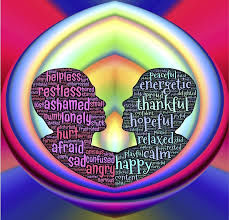Pessimism
9 Positive Benefits of Negative Thinking
To keep your life on a positive track, activate your negative thinking skills.
Posted December 13, 2019 Reviewed by Lybi Ma

In Praise of Negative Thinking
The idea that negative thinking can have its virtues might be shocking to some. Shouldn’t we focus on the positive?
Yes, when we can. Cultivating positive emotions like gratitude, kindness, and love yields a cornucopia of benefits. Better physical and mental health, better relationships, creativity, longevity, even a stronger immune system—these are just a few of the many happy outcomes of positive emotions and attitudes that have been confirmed by decades of research.
A heart filled with joy and gladness can be a wonderful thing, but some people seem to have lost their survival sense. Think of the man who steps into the street while texting. The woman who sends her life savings to a scam artist who claims he loves her. The young couple who has sex without protection. Where is the famous "negativity bias" when we need it?
Let’s face it: Some people need to see the cloud instead of the silver lining.
In this blog post, I’ll explain a few key benefits of negative thinking and how it can help you approach life in a more positive way, ironic though it may seem.
To be clear: By negative thinking, I do not mean negativity. “Negativity” involves a habitual attitude of anger, cynicism, helplessness, or sadness in all or many situations. “Negative thinking,” by contrast, means the ability to see the potential dark side of people, ideas, places, and things, in order to respond to them in a realistic and self-protective manner.
9 Positives of Negative Thinking
Of course, life would be a poor thing if we only saw the disadvantages and downsides of every situation. But a little negative thinking can be an invaluable tool for surviving and thriving in life. Here are some virtues of the “what’s wrong with this picture” mindset.
1. Negative thinking could save a life.
A woman leaves her car door unlocked with the motor running because she is going into a store just “for a minute.” Her child is in a car seat in the back.
A man leaves his house unlocked because he needs to make a quick trip to the drugstore, and “I live in a safe neighborhood.”
It’s shameful and scary that in our society we have to think about personal safety at every moment. And all of us will let down our guard at some point. But if you use negative thinking rather than wishful thinking, you are more likely to stay alert to danger. Obviously, if you are dead, you can’t very well enjoy the positive benefits of life.
2. Negative thinking helps you envision the worst thing that can happen—and often prevent it.
Tourists are allowed on an island even though there are rumblings from an active volcano. A duck boat goes out on a lake despite storm warnings, and passengers are not wearing their life vests. The pilots on a new type of airplane are not given appropriate safety training.
Ripped from the headlines! Do you recognize these recent news stories? Although many horrible accidents cannot be anticipated, negative thinking may have prevented or mitigated the disastrous consequences of the above situations. Practice thinking about the worst-case scenario.
3. Negative thinking helps you set boundaries.
“I was hoping to meet someone like you tonight. How about coming back to my place?”
Hmm. A risky proposition. Before making a decision, get in touch with your inner caution-light. While your new friend from the bar is unlikely to be a serial killer, who knows? See #1.
To counter requests that are unreasonable, dangerous, or an invasion of privacy, use one of these universal assertive comebacks: 1. “No, I wouldn’t be comfortable with that.” 2. “I’ll think about it." Of course, if you are in immediate danger, call 911.
4. Negative thinking saves you money and time.
The Powerball jackpot is out of sight. You are tempted to jump in the car and buy a few tickets from your local grocery store.
If you have the money and time and use your negative thinking to realize that you are unlikely to win, such activities can be harmless fun. And some people enjoy contests and games of chance as a hobby. That's fine. But most of us need to be careful about frittering away our time and money on low-yield activities—activities which don't add meaning to our lives. (By the way, instead of playing the lottery, be a sure winner with these “lucky numbers.”)
5. Negative thinking helps you avoid scammers and other criminals.
Scammers are sometimes sociopaths who lack compassion and morality. They are extremely smart about manipulating others to get what they want. No one is completely scam-proof, but a little skepticism will sharpen your B.S. detector.
That suspicious-looking email with awkward phrases and misspelled words? Delete it. The phone call with no ID? Don’t answer it. Follow your negative intuition!
6. Negative thinking slows down your decision-making, allowing you to make more thoughtful choices.
E-cigarettes were originally touted as a harm-reduction technique for adults who wanted to quit smoking. Now a significant number of young people are addicted to e-cigarettes, and there have been cases of lung disease and death from vaping in every state. Moreover, the nicotine in e-cigarettes can cause long-term damage to the developing teenage brain. Question: What will we discover about CBD and kratom in the coming years?
Use your negative thinking and adopt this motto: “When in doubt, wait.”
7. Negative thinking helps you look at yourself and others more realistically.
Persisting in a chosen career or personal path in spite of difficulties is a good thing—except when it isn't. Sometimes it makes sense to give up unrealistic ambitions and hopes and put your energy into a new endeavor.
PT blogger Guy Winch, author of How to Fix a Broken Heart, has a useful negative-thinking tip for those who are making themselves miserable by idealizing a former lover: Write a list of negative qualities of that person. Keep it in your phone and look at it frequently. Your broken heart will begin to mend.
8. Negative thinking can give you a healthy skepticism towards authority figures.
Another name for “negative thinking” might be “critical thinking.” When you think critically, you are less likely to swallow false and harmful assertions, accept excuses, or fall for myths. “Blind belief in authority is the greatest enemy of truth,” Albert Einstein said.
9. Negative thinking helps you notice injustice and motivates you to make changes.
If you can’t see what’s wrong, you can’t make it right. Anger, irritation, and sadness are helpful clues that something needs changing in your life or in the world.
The Balancing Act
In sum, consider using the power of negative thinking. It can help you protect your life and health by saving you time, trouble, and money, and by sorting out the good people from those who might take advantage of your caring nature. While positive emotions such as gratitude, happiness, and love make life worth living, a dash of negativity can be a helpful spice in the recipe for a good life. So accentuate the positive, but don’t eliminate the negative.
(c) Meg Selig, 2019. For permissions, contact me here.




